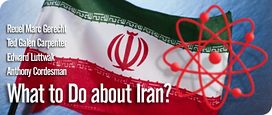Okay, let’s try to take this in order. First, if Mr. Carpenter thinks either my original commentary or my response contained a heavy dose of Iranology, then that perhaps underscores why Mr. Carpenter prefers to talk about Maoist China. I can think of several folks who write well on Iran and who usually take opposing views, especially on the nuclear issue. They do, however, the basic homework. I try never to talk about North Korea since I have no serious grounding in the subject; Mr. Carpenter might consider doing the same on the Islamic Republic. And, incidentally, as could be noticed in both my original piece and in my response, I do not underscore President Ahmadinejad’s commentary. His views do not markedly differ on the most important external issues from Khamenei’s; and I would argue that his differences with Rafsanjani overseas are more tactical than strategic. (Rafsanjani, who ought to be viewed as the father of Iran’s nuclear-weapons program, and who was probably the majordomo behind Iran’s world-wide assassination/bombing campaign in the 1980s and 1990s, also spent some effort developing a divide-and-conquer strategy towards Europe vis-a-vis the United States—an approach which Ahmadinejad has trashed.)
Mr. Carpenter’s apocalyptic scenarios for preventive military strikes seem, to put it politely, hyperbolic. The land invasion of Iraq didn’t cause anywhere near these fatalities. I’m not the biggest fan of Mr. Rumsfeld’s military transformation plans, but one thing is clear after the two Gulf wars: civilian casualties from air campaigns—particularly ones that are highly restrictive as would be preventive military strikes on Iran—are becoming, by any historical standard for warfare, small, and if one ever can say these things about warfare—and one should given the enormous time and effort the U.S. Air Force and Navy spend on reducing civilian fatalities—“humane.” I would, nonetheless, argue that it would be wise to attack Iran’s nuclear weapons facilities before they reach a point where uranium processing and enrichment could contaminate a substantial area.
And If Mr. Carpenter thinks that the U.S. and the Europeans can actually bribe the clerical regime into nuclear submission, then he really ought to explain exactly what these “incentives” are and why historically he thinks this could work with the clerical regime, especially if Mr. Carpenter, or those with a similarly pacific disposition, were sitting across the table from the mullahs. It’s very unlikely they would be much intimidated. It’s clear that Mr. Carpenter wouldn’t threaten any military action. If you’re a mullah, why not have your cake and eat it too? Or does Mr. Carpenter believe that the mullahs are really misunderstood (foreign policy as psychiatry)? They’re really soft-power types who only act the way they do because of American “aggression.” (In answering this, do try to remember the commentary of someone like Abdallah Nuri before the Special Clerical Court or that it was Ayatollahs Kashani and Behbehani who orchestrated the ‘53 coup against Mossadeq.)
I suspect—Mr. Carpenter will have to tell us—that he would not have approved of the Israeli preventive military strike against Saddam’s Osirak reactor. That the thought of such military action by the U.S., or Israel, would be repellent even in the case of Saddam, when he was clearly gunning for a nuclear bomb (and the modern Middle East would certainly be a different place if the Butcher of Baghdad had got an atomic weapon in the early 1980s).
Last point: there is a very long history of Westerners predicting that the Arab and Muslim streets will rise against this or that Western power doing something particularly unpleasant in the Muslim Middle East. From 1914 forward, I can’t think of a single instance where these predictions have proven correct. The ones made in 1991 and 2003 have proven particularly risible. It would, however, be great fun imagining the Saudis and other devout Sunnis rising indignantly on behalf of their defanged Shiite brethren. There are many other things that better inspire these gentlemen to aid and abet holy war against us. Given the pathetic state of Shiite-Sunni relations, it is almost something to be hoped for.

